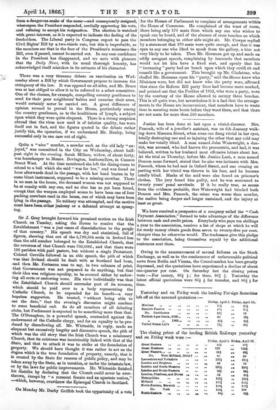Sir J. Gray brought forward his promised motion on the
Lish Church on Tuesday, asking the House to resolve that the Establishment "was a just cause of dissatisfaction to the peopje -of that country." His speech was dry awl statistical, full of -figures, showing that out of the 5,7.98,561 souls in Ireland less -than the odd number belonged to the Established Church, that the revenues of that Church were 700,000/., and that there were 199 parishes with paid pastors, but without a single Protestant. Colonel Greville followed in an able speech, the pith of which -wee that Ireland should be dealt with as Scotland had been, and then Mr. Forteseue rose to say, in two columns of print, that Government was not prepared to do anything, but that their idea was religious equality, to he secured either by endow- ing all sects or endowing none. His view individually, was that the Established Church should surrender part of its revenue, which should be paid over to a body representing the Catholic Church, to be expended for its benefit—a very hopeless suggestion. He trusted, "without being able to see the date," that the evening's discussion might conduce to some beneficial end. So do all members of all debating 'clubs, but Parliament is expected to be something more than that. The O'Donoghue, in a powerful speech, contended against the endowment of the Catholic clergy, and for an equality to be pro- -duced by disendowing all. Mr. Whiteside, in reply, made an eloquent but excessively lengthy and discursive speech, the pith of which was the old story that the Irish Church was a missionary -Church, that its existence was inextricably linked with that of the -State, and that to attack it was to strike at the foundation of property. We should have thought it WM rather to act on the tlogina which is the true foundation of property, namely, that it is created by the State for reasons of public policy, and may be taken away by the State, as in taxation, or wider the intestate law, or by the laws for public improvements. Mr. Whiteside finished his diatribe by declaring that the church, could never be over- thrown, except by "a reereeat Senate and an apostate nation," —which, however, overthrew the Episcopal Church in Scotland.






























 Previous page
Previous page